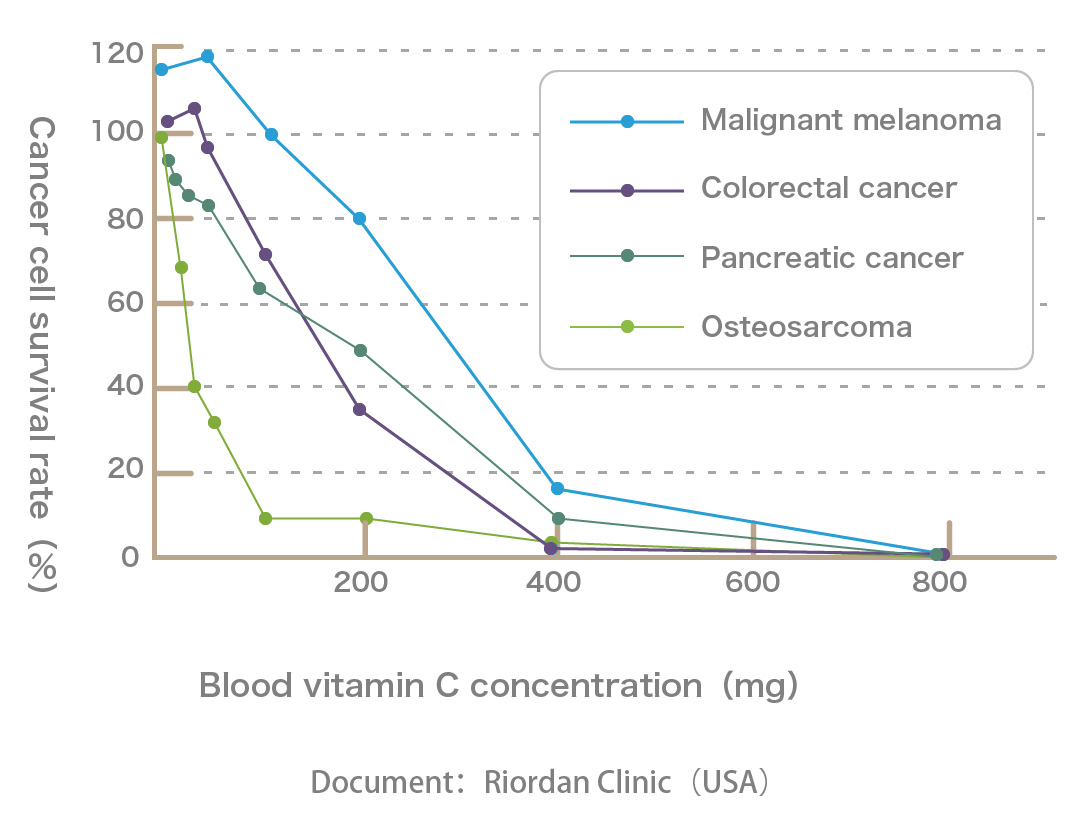In 2005, the scientists belonging to National Cancer Institute, National Institutes of Health and Food and Drug Administration published a collaborative paper in Proceedings of the National Academy of Sciences of the United States of America on the theme of “Highly concentrated vitamin C preferentially attacks and completely kills cancer cells.”
With this, the highly concentrated vitamin C instillation therapy started to be spread and researched mainly by university hospitals in USA as an adjunctive therapy for caners.
Meanwhile, in Japan, this treatment began to be gradually introduced from 2007 as an alternative for cancer treatments.
During the process in which vitamin C has strong antioxidant properties by being oxygenized, a massive amount of hydrogen peroxide is produced.
When hydrogen peroxide is administered into the blood, whereas normal cells can neutralize it, cancer cells cannot neutralize it and accordingly get killed. Paraphrasing this, highly concentrated vitamin C works also as an《anticancer agent》against cancer cells. It has been announced that this behavior is effective in virus infection treatments as well.
Moreover, many papers have argued that the highly concentrated vitamin C instillation therapy alleviates the symptoms of cancer patients including pain, fatigue, loss of appetite and insomnia and accordingly maintains their quality of life (QOL).
In addition, there have been some reports on the cases where the highly concentrated vitamin C instillation therapy by itself or the combined treatment with another cure prevented the progression of a cancer and reduced the size of a tumor. One of the most significant advantages of the highly concentrated vitamin C instillation therapy is that it has very few painful adverse effects unlike many of those caused by chemical cures.
Relationship between blood concentration and cancer cell survival rate
The higher the blood concentration of vitamin C, the lower the survival rate of cancer cells (the cancer cells die).
Precautions
Those patients with G6PD deficiency involving an inherited enzyme abnormality in red blood cell membranes are not allowed to receive this treatment.
Our clinic makes it a rule to conduct a G6PD test on patients before they receive a drip of 25 – 50+ grams of vitamin C. Also, those patients on dialysis from renal failure are not allowed to be subject to this treatment either. Further, those patients suffering from cardiac insufficiency, massive ascites or gross edema may be ineligible to receive this treatment because their disease condition might get worsened due to the intravenous injection of liquid.
Side Effects
◯
Rare bleeding from Tumor
This side effect can be observed through a chemical cure as well.
◯
Pretended High Blood Sugar
During the several hours after a drip, your blood sugar level measured with a simplified blood sugar meter will be higher than your actual one. Those patients with diabetes currently under the insulin treatment are requested to adjust the amount of insulin after consulting with their primary doctor.

